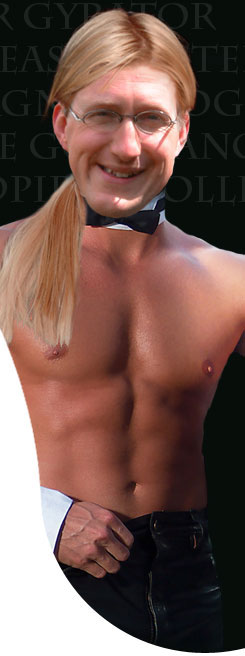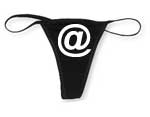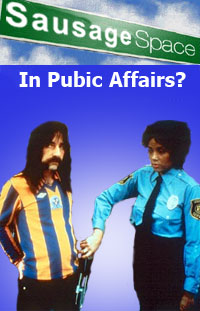Alan Titchmarsh: Man or Monster?
 Thinking that I was in time for Top Gear, I turned to BBC2 a bit too early last night, forgetting that their highest rated show (and one of the few things the BBC are getting right at the moment) had been postponed in favour of the snooker. However, my disappointment was lessened a bit by the discovery that BBC2 were broadcasting a new wildlife series, The Nature of Britain, which has always been another of the things that they do well. In fact, saying that the BBC does wildlife well is like saying the Pope knows his Catholicism. In God’s great plan: the two were made for one another. And, after all these years, both are just as predictable. You know what to expect: great photography, good writing, a broadly conservative presentation, and the occasional day of judgement usually involving a rigged telephone poll.
Thinking that I was in time for Top Gear, I turned to BBC2 a bit too early last night, forgetting that their highest rated show (and one of the few things the BBC are getting right at the moment) had been postponed in favour of the snooker. However, my disappointment was lessened a bit by the discovery that BBC2 were broadcasting a new wildlife series, The Nature of Britain, which has always been another of the things that they do well. In fact, saying that the BBC does wildlife well is like saying the Pope knows his Catholicism. In God’s great plan: the two were made for one another. And, after all these years, both are just as predictable. You know what to expect: great photography, good writing, a broadly conservative presentation, and the occasional day of judgement usually involving a rigged telephone poll.
I joined the show late, but, within a minute, cows were defecating in high definition in the corner of the room. Perfect viewing after my Sunday dinner, I thought, though not everybody else in the room was equally smitten. They made their excuses and left me to watch the rest of the show. I surprised myself that I made it to the end. Not because of the defecating cows, you understand, but because of the chap who provided the soundtrack.
David Attenborough’s announcement that he was retiring from making BBC wildlife documentaries caused much debate as to who was going to get his job. Last night, I witnessed the apparent winner. Alan Titchmarsh. I think the defecating cows were robbed.
I’m ashamed to say that I always had a soft spot for Titchmarsh back when he used to dig people’s gardens for a living. He was twee, cosy, comfortable, somewhat patronising, prissy, at times pretentious, but generally amiable. Ground Force was a terribly watchable show as Charlie Dimmock would stand, hands on hips, her unharnessed chest thrown out, leaving Titchmarsh to make some wry comment about the cold weather. It was the programme that always left me feeling the same towards him as I feel about Christians in general: that they do nobody any harm and have a comfortably line in knitwear.
Only, like my tolerance for Christians, I have a line across which men called Titchmarsh should not cross. Much as I don’t like to be woken on a Sunday morning to be asked if I believe that Christ is my redeemer, nor do I like to see men getting a bit big for their Wellington boots.
It all began when Titchmarsh started to turn up and stick his fingers in our whole cultural buffet. He began to write novels with dire gardening puns in the title (Trowel and Error). Then he did radio, his own talk show, and, more recently, turned up hosting the Proms for the BBC. He was even rumoured to be in running to take over Countdown after Des Lynam was run out of Leeds. Titchmarsh was clearly elbowing his way into anything that required a man of moderate intelligence, fiercely middle-class tastes, and a ‘nice’ personality for whom the oldies would happily make sponge cakes. He’s the sort of man that if Thora Hird wanted to send messages back from the other side, she’d channel through Alan. (And before you do it, I’ve already sent the BBC my idea for a show called ‘Channeling Through Alan’. I’m told they’re considering the idea.)
Now that he’s just settled for becoming the face of wildlife shows on the BBC, Titchmarsh is set to become ever present on our screens. But to me it’s like Ronald McDonald has been given charge of a petting zoo.
I don’t wish any harm to the man but I rarely find myself calm after any time in his company. His use of bathos is the most galling, in that he has this way of trying to sound martial, grand, and epic but ends up sounding like a tax inspector having an enema. It usually involves him quoting some poetry (he loves his poetry), his voice wallowing in the luxurious description of some great English scene, to which he then usually adds his own: ‘you bet…’ or ‘you can say that again…’
There’s a fun game I've invented which you can try to help make Titchmarsh more bearable in which you try to write your own Titchmarsh script. Take any lines of English poetry and complete them in the style of the great Alan. I’ll start you off with two examples. First, Wordsworth:
That floats on high o'er vales and hills
Or Shakespeare, from Henry V:
‘I bet you did. And while Bill Wordsworth was larking about on all those Lakeland hills, perhaps dropping in to see Mr. Norris’s excellent shop, selling original mint cake, he must have wondered what a cloud would think if it saw all the people flocking to the Lakes…’
Straining upon the start. The game's afoot:
Follow your spirit, and upon this charge
Cry 'God for Harry, England, and Saint George!'
'By heck! Bet he’s a lot of fun come a Monday. But, you know, perhaps old Bill Shakespeare has a point… This war business isn’t at all as messy as we’ve been told it is. A bit of victory here, a spot of honour there. And before you know it, a lovely field full of bright red poppies, luxuriating under a mid-summer sun.'
He was at it again last night, after the cows had stopped defecating. The BBC Wildlife department had strapped a camera to a swan or something with a similar wingspan, and sent it soaring up over the countryside. Alan had then added his own special flourish, by quoting Auden, or Byron, or Pam Ayres, for all I know... I can't say which. I was too busy strangling the life out of the sofa’s cushion.
It sounds very mean spirited of me to criticise a man who has made a virtue out of being pleasant but I say he’s a poor role model for a nation aspiring to make a name for itself in the twentieth century. While Titchmarsh fills our minds with ideas of lounging around in hammock in the garden, the Chinese are out there building warships and stockpiling germs. While Titchmarsh is encouraging us to reach for our copies of Milton and Shelley, the North Koreans are returning their copy of ‘Nuclear Fission for Dummies’ to the Iranians. While Titchmarsh rambles, the country sleeps. We should take this as a warning and put him back to doing what he does best. Digging deep bunkers in shrubberies.






